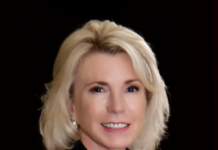Jodie Kelley Podcast Transcript
Jodie Kelley joins host Brian Thomas on The Digital Executive Podcast.
Welcome to Coruzant Technologies, Home of The Digital Executive Podcast.
Brian Thomas: Welcome to The Digital Executive. Today’s guest is Jodie Kelly. Jodie Kelly is the CEO of Electronic Transactions Association, or known as ETA, the trade association representing the payments technology industry. Jodie brings to ETA more than 25 years of experience managing and providing strategic guidance to large organizations.
Transcription As CEO, Jodie serves as the voice of, and representative for, the innovative and dynamic payment ecosystem and directs the international public policy, industry affairs, and educational activities of ETA. Prior to joining ETA, Jodie served as Senior Vice President and General Counsel for BSA, the Software Alliance.
In that role, she had broad responsibility for strategic, operational, legal, and financial issues, overseeing programs that supported the software industry in more than 30 countries around the globe. And acting as a spokesperson for BSA and the business software industry in front of a wide variety of audiences.
Well, good afternoon, Jodie. Welcome to the show!
Jodie Kelley: Thanks. It’s great to be here.
Brian Thomas: Absolutely. Thank you for making the time. Appreciate it. You know, sometimes I traverse the globe, but I love doing this on a daily basis, jumping out of bed and meeting some great people like yourself.
Jumping right into your first question here, you’ve got over 25 years of experience managing large organizations. Can you share some pivotal moments in your career that led to your current role as CEO of Electronic Transactions Association or ETA?
Jodie Kelley: Yeah, you know, my career is actually not particularly linear in a way that I have to say has been amazing. You know, I started my career as a lawyer. I’m a lawyer by training and I have been practicing law for a number of years and I had a mentor then who said to me.
I gave you the best advice I’ve ever gotten in terms of my career. And what he said was, you know, do what you love, do what you think is fun. Because if you are enjoying yourself, you’re going to be good at it and you’re going to be successful. And, you know, it sounds like obvious advice. I will tell you, you know, lawyers tend to be pretty focused people, but I really tried to keep that in mind.
And so, I started my career as a lawyer. I found that I really loved a few things about it. I loved the strategy. I loved being an advocate and I love telling a story. And so, as my career progressed, I looked for opportunities to lean into those things that I really loved and I made my way in house to a financial services organization and then into the trade association world where I represented software and found out I love technology and then now representing the payments industry, which is just an absolute joy.
I get to do all the things that I love to do. I get to be an advocate for the industry. I get to tell a story for the industry. We get to set strategy and I get to manage a fantastic team, which I also found that I really liked. So it’s been a bit of a windy career, but it has taken me exactly where I meant to be.
Brian Thomas: That’s awesome. And we always learn something from a mentor, somebody that guides us early in our career, helps us point that trajectory and move forward in a place that we actually excel at or find something that we love. So, thank you for your story. And Jodie, as CEO of ETA, what are some of the most significant challenges and opportunities you see in the payments technology industry today?
Jodie Kelley: The payments industry, I have to say, is an industry that I had never thought of as an industry until I got approached about this job because payments is 1 of those things that we just do. You know, we take it for granted a little bit. It’s part of a different experience. Typically, we’re either buying a pair of shoes and, you know, that’s how we make the purchase or, or we’re getting gas in the car or we’re calling a ride share app and paying for it.
But, you know, you don’t really think about the payments experience. The payments is a fascinating industry. Its very technology based. It is evolving very quickly. It grows, of course, and helps grow the economy. And the innovation that’s happening in space is just insane. When you really think about the trajectory of the payments industry over the past 10, 20 years, it is as innovative and as exciting as any other industry.
And the opportunities are everywhere. I mean, so, you know, just think about it. It’s not just those experiences that I just rattled off. Like, how do you pay for your groceries or. You know, how do you pay for, you know, ice cream, but it’s, you know, I’m a small business and I’m trying to get off the ground and how can I boost sales and incorporating electronic payments, experiences, boost sales, and it not only causes more people.
To come in and purchase because it’s easy, but it also causes ticket prices to go up or what about I’m a small business. And not only do I want to boost sales, but I need a solution that helps me manage my business because I’m tiny and I don’t have time to do anything other than get done. What needs to get done well, you know, software is integrating payments.
So, you have single solutions that can help schedule your employees or order your supplies and accept payments as you think about, like, every segment of the economy. Whether it is, you know, small businesses, large businesses, businesses that want to go digital online consumers who have not been part of the financial ecosystem.
There are payment solutions that are kind of reaching these people in these companies. So, there’s unbelievable possibility. And, you know, we’ve all seen, you know, you go to a store and leave without having to even tap a card right on the way out or. You know, pay with your watch or, you know, the innovation happening in payments is crazy.
Tons of opportunity where there’s opportunity. There’s always a challenge. So public policy is a place that we focus a lot. If policymakers get the policy environment wrong, it can really stifle innovation. And that’s true in payments. And that’s true in every kind of innovative technology area. But it is a place that, you know, you have to be deeply engaged in on an ongoing basis.
You know, to make sure that policymakers who are well intentioned don’t inadvertently, you know, put policies in place that make it harder to innovate and harder to create. So that’s a big area and that’s true, both at the federal level and in the states where a lot of legislative activity happens and, of course, at the regulatory level as well.
So, public policy is 1 big area that may not be obvious when you’re thinking about what the challenges with industry are, but it’s, it’s a real 1. and then the other thing I would mention is it’s a challenge that this industry is clearly up to, but it’s a real challenge. And that is security when you’re talking about moving people’s money, which you are in the payment’s context.
You know, there are always bad actors who want to inject themselves into that movement and commit fraud. And, you know, fraud is an ongoing challenge. It’s going to be an ongoing challenge. It’s just the nature of the business. And so the industry spends significant time and resources fighting that fraud and, of course, making consumers whole.
You know, in those instances where there’s credit card fraud, for example, 60 percent of U. S. credit card holders have been victimized by fraud and 52, 000, 000 Americans reaching about 000 dollars. It’s a real problem, but it’s 1 that this industry is committed to meeting and has been meeting.
Brian Thomas: Thank you, Judy, for laying all that out for us today.
It is important to recognize what goes into, you know, electronic payment processing innovation. Obviously, this carries a big part of this. Now, the next thing we need to focus on is how do we reduce fees for a lot of small businesses? I hear that all the time. Small businesses, even on the podcast. You know, transaction fees are what kills small businesses, but that seems to be always the last on the list of things to do, unfortunately, but I’m glad you’re working on that.
So, appreciate that. And Jodie, the payments industry is rapidly evolving with digital transformation. How is ETA helping its members adapt to and capitalize on these technological advancements? I’ll
Jodie Kelley: tell you a few things that we’re doing, and I, you know, I will say one of them is education. And we are educating, you know, everyone in the ecosystem, including the public and 1 of the things we educate about is the value of the ecosystem.
It is fascinating to me, but you understand how it happens when something works really well. You kind of take it for granted, right? You take it for granted. That you can walk into that small business that you were just talking about. And you don’t have to have cash in your pocket. You can use your card and frequently you can use your phone.
You know, you don’t even have to remember to carry your card or pull it out. And consumers have confidence in that ecosystem, right? But don’t think about it. You tap your card, or you tap your phone and you, you know, it’s going to work. And, you know, importantly, as we just discussed that, it’s secure, right?
You don’t worry about, like, as I do, this is somebody stealing, you know, my credit card number. You don’t know that it’s because the answer is no, because it’s tokenized. You don’t know the technology that underlies it, but you have that confidence in it and educating consumers, educating businesses and importantly, educating policy makers.
You know, about that value, I mean, you know, your point is right. You know, there’s a cost associated with accepting payments, but there’s so much value that goes with it. And so just, you know, putting it out there. Like, what that value looks like, so that people understand. You know, what it is they’re getting and 1 of the things they’re getting, I should mention is rewards, which are a personal favorite of mine.
I love getting my rewards and I just use them to take a trip. So I’ve been saving them forever. And I know how the opportunity to use them. So, education is part of it. And we, we do that both. You know, 1 on 1 with policymakers and others, and we also do we have online courses because it’s a complex ecosystem.
And again, it’s 1 that most people never think about and really never have to think about. But if you’re a part of it, we make sure that there’s clear education. We also provide advocacy. We talked about engaging with policymakers’ compliance. You know, this is a heavily regulated industry for good reason.
This is people’s money. And so, compliance is critical and that’s a service that we help our members with. And then we provide community, you know, whether it’s bringing people together to learn, bringing people together to do business, you know, this is an ecosystem. And so, we sit at the center of it. And so we serve a convening and a networking function.
Brian Thomas: Thank you, Jodie. I appreciate that. You know, education and the communication part is so key to this. And you did again, break this down a little bit further. So, our audience can better understand what goes into electronic payment processing and how people do get that education. So, I appreciate that. Jodie, last question of the day, looking ahead, what are some of the emerging trends in the payments technology space that you believe will shape the future of the industry?
Jodie Kelley: So, what I would say is when you think about technology and how it’s evolving more broadly, you’re going to find an application and payment. So, obviously, everyone’s talking about Artificial Intelligence right now, you can’t have a conversation without talking about, but, you know, as compute power grows as the ability.
You know, to take that technology and, and, and kind of, you know, embed it in business processes grows. You’re certainly going to see that used in payments. I will say payments have been using machine learning for decades, particularly to fight fraud again. You’re looking for patterns from huge quantities of data that a human I couldn’t discern, but I is going to continue to play an increasing role in payments and then other technologies, like biometrics, for example, you know, part of that security effort that we’ve been talking about.
Is ensuring that when somebody goes to make a payment, you know, whether it’s with a card or direct from an account that they are who they say they are. And there are lots of ways that the industry is leveraging tech to do that. Biometrics is 1 that I just personally find particularly interesting, but it’s a great example of the kind of technology that we’re going to continue to see.
Brian Thomas: Thank you, Jodie. I do like highlighting some of the tech. Obviously, this is a tech podcast. One thing we do highlight a lot, I’d say in the last 12 plus months was AI, which is a word that’s been almost, I would say overused at this point. I love the fact that you did highlight biometrics because that is important and that just adds that extra layer of security, which we truly need in our society today with our financial transactions.
Jodie Kelley: No question at all. I mean, the, the, the technology that underlies this, this industry is, is so critical, you know, we, we touch on things like tokenization and, you know, just, just frequently tied to security, which is so, so critical.
Brian Thomas: Absolutely, and I really do appreciate it again, breaking everything out for our audience today, Jodie and Jodie.
It was such a pleasure having you on today and I look forward to speaking with you real soon.
Jodie Kelley: Yeah, it was terrific being here. Thank you for having me.
Brian Thomas: Bye for now.
Jodie Kelley Podcast Transcript. Listen to the audio on the guest’s podcast page.











